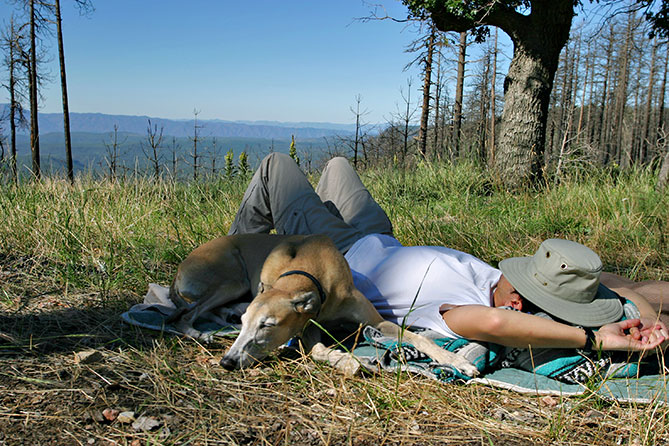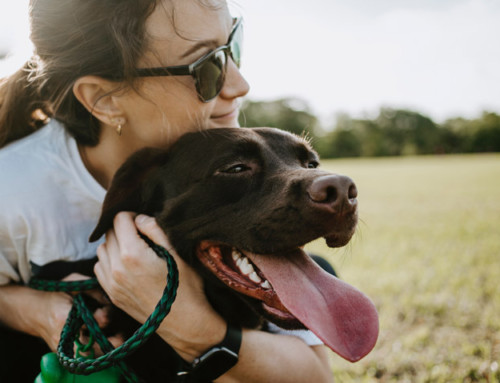With summer around the corner and summer weather on its way, families and pets will be enjoying more outdoor activities.
But a vet from DOGS NSW, Dr Karen Hedberg, is warning pet owners that it is one of the most dangerous times of the year for our furry friends.
She said this is due to soaring temperatures, bushfires, an influx of pests such as snakes and ticks and not to mention every dog’s worst nightmare – thunderstorms.
And to ensure the safety of your pets, there are simple steps owners can take such as having plans in place and pet insurance to make sure you don’t get hit with unaffordable vet’s bills.
However, one of the most essential things to tick off your checklist is for pets to be identifiable with collars, to be microchipped with updated contact details, and we suggest registering with Lost Pet Finders (it’s free) so that you can quickly mobilise an army of local pet finders if your pet goes walkabout.
Here’s some more information that might help you prepare for summer:
1. Hot Weather
We hear a lot about the dangers of leaving children in locked cars – exactly the same issues apply to pets.
“Dogs can’t sweat to cool themselves, so they can develop heat stroke and die very quickly in hot conditions. Very young, senior and brachycephalic (flat-faced) dogs are also more susceptible to heat,” Dr Hedberg said.
If a dog had heat stroke some signs may include excessive panting, bloodshot eyes, wheezing, vomiting, weakness and reddened gums.
When these signs are visible, pet owners are urged to bring their dog to a cooler environment and to gently hose them with cool water. However, if their condition doesn’t improve, it’s best to bring them to the vet.
Just like humans, dogs also run the risk of sunburn and skin cancer, even if they do have a thick coat.
2. Bushfires
With bushfire season approaching, it’s important to include ALL pets in a fire survival plan.
According to Fairfax Media in August a woman who was living in an Ingleburn home she was leasing caught on fire. It was only by luck a truck driver was passing by and saved her from the flames. However, her birds and dog all perished in the fire.
Now she’s calling for other pet owners to consider a fire plan. Although she lost most of her valuables in the fire, Catherine Head told Fairfax Media, her biggest loss was her dog, Roxy.
“Even if you don’t think it will happen to you, make sure you consider your pets and where they are. If they aren’t outdoor pets, ensure they are near a window or door,” she said.
Hugh Gent, a NSW Rural Fires Service Captain and Honorary Life Member of Dogs NSW provided some tips:
- If there is a fire threat, leave early.
- Have crates, dog trailers, food, water bowls, medication and blankets ready to go.
- Ensure your dogs are secured so that you can load them up quickly. Precious time can be lost rounding up dogs that are running loose and who may be distressed by smoke, fire sirens, helicopters and other unusual activities.
- Don’t just drive off without a plan. Determine where you are going to relocate, far from a danger zone.
3. Snakes and tick bites
It’s known that Spring and Summer weather brings out the snakes – which like the sun.
Snake bites aren’t uncommon in dogs because both have a defensive nature. So if you’ve spotted snakes in the area or have one that’s slyly slithered on your property, put your dog inside or ensure it doesn’t go near high grass and rocks – a snake hot spot. Snake catchers also recommend cleaning up the backyard as it can attract a snake’s prey.
If a dog is bitten it can be fatal if the snake is venomous.
Symptoms include shaking, twitching of muscles, vomiting, paralysis, enlarged pupils, loss of bladder control and weakness.
“If you suspect a snake bite, keep your dog calm and quiet, and get it to the vet immediately – it will be the difference between life and death. Be prepared by locating vets who stock anti-venom.”
Ticks are also a common threat in summer as they release a toxin that can lead to paralysis – and unfortunately ticks are on the rise!
Common signs of tick paralysis include choking and an inability to bark properly.
“Consult your vet for advice on tick prevention products, and if you notice any signs of a possible tick bite, get your dog to the vet immediately,” the vet said.
4. Thunderstorms and fireworks
Many animals may have a change in behaviour during a thunderstorm and fireworks, and they can develop a phobia.
It can be a challenge calming and controlling pets in bad weather but Dr Hedberg said there are products and strategies that can help.
“To help reduce anxiety, ask your vet about calming pheromone products. Consulting a veterinary behaviourist may also help your dog get through the summer storm and fireworks season.”







[…] Other locations such as Observatory Hill Park and Blues Point Reserve are great vantage points for fireworks. Although these are dog-friendly parks it’s best you don’t take your four-legged friend out with you as fireworks can be incredibly distressing for dogs. […]